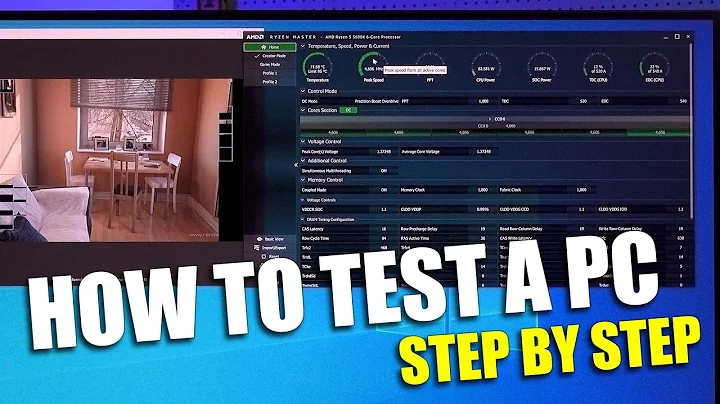Ubuntu 16.04: CPU Stress test
The delay you are talking about will always be there. It takes some time to load apps or files from the disc to ram. You can reduce this delay by switching to a faster hard drive or a solid state drive but it can't be eliminated. Speed of the mass storage media has always been a bottleneck, and the situation doesn't seem to change very soon. If the app runs smoothly once it has finished loading, there is nothing to worry about.
Related videos on Youtube
Comrade
Updated on September 18, 2022Comments
-
 Comrade almost 2 years
Comrade almost 2 yearsI have
Lenovo Thinkpad E531, Core i3. I feel my machine is not working properly, Like opening applications, File to file opening, Everything takes a bit extra time both on linux and windows, But now i am using ubuntu 16.04.So i used
stress-ng.With the following command
stress-ng --cpu 4 --cpu-method matrixprod --metrics-brief --perf -t 60.I got the following results:
stress-ng: info: [4717] dispatching hogs: 4 cpu stress-ng: info: [4717] cache allocate: default cache size: 3072K stress-ng: info: [4717] successful run completed in 60.01s (1 min, 0.01 secs) stress-ng: info: [4717] stressor bogo ops real time usr time sys time bogo ops/s bogo ops/s stress-ng: info: [4717] (secs) (secs) (secs) (real time) (usr+sys time) stress-ng: info: [4717] cpu 16728 60.00 220.07 0.48 278.78 75.85 stress-ng: info: [4717] cpu: stress-ng: info: [4717] 486,809,130,288 CPU Cycles 8.11 B/sec stress-ng: info: [4717] 299,665,293,760 Instructions 4.99 B/sec (0.616 instr. per cycle) stress-ng: info: [4717] 23,618,473,352 Cache References 0.39 B/sec stress-ng: info: [4717] 155,046,972 Cache Misses 2.58 M/sec ( 0.66%) stress-ng: info: [4717] 340,515,406,760 Stalled Cycles Frontend 5.67 B/sec stress-ng: info: [4717] 173,093,935,356 Stalled Cycles Backend 2.88 B/sec stress-ng: info: [4717] 36,696,289,676 Branch Instructions 0.61 B/sec stress-ng: info: [4717] 289,823,652 Branch Misses 4.83 M/sec ( 0.79%) stress-ng: info: [4717] 22,175,572,704 Bus Cycles 0.37 B/sec stress-ng: info: [4717] 510,047,929,756 Total Cycles 8.50 B/sec stress-ng: info: [4717] 776 Page Faults Minor 12.93 sec stress-ng: info: [4717] 0 Page Faults Major 0.00 sec stress-ng: info: [4717] 22,952 Context Switches 382.46 sec stress-ng: info: [4717] 188 CPU Migrations 3.13 sec stress-ng: info: [4717] 0 Alignment Faults 0.00 secNow i don't know whether the results are fine or if its ambiguous?
Update
As @ColinIanKing
author of stress-ng, Mentioned in the answer comment, The results ofvmstat 1is :procs -----------memory---------- ---swap-- -----io---- -system-- ------cpu----- r b swpd free buff cache si so bi bo in cs us sy id wa st 2 0 0 213980 69832 1450000 0 0 672 0 793 3419 26 2 69 3 0 1 0 0 213360 69832 1450060 0 0 0 312 1155 3243 30 2 68 0 0 2 0 0 213420 69848 1450072 0 0 4 120 991 2534 29 2 68 2 0 1 0 0 213172 69848 1450072 0 0 0 0 1306 2173 28 2 70 0 0 2 0 0 174192 70008 1465956 0 0 4964 96 2152 8701 29 5 48 18 0 0 0 0 141592 70136 1467132 0 0 4240 0 1838 6137 15 4 70 11 0 2 0 0 129532 70136 1466920 0 0 296 12 1718 4069 16 3 80 0 0 0 0 0 128664 70136 1467084 0 0 128 0 1436 3546 15 3 82 0 0 1 0 0 138956 70136 1467212 0 0 128 0 1508 3388 14 3 83 0 0 0 0 0 213120 70152 1452916 0 0 1284 128 1817 6011 23 4 70 4 0 0 0 0 212920 70152 1452928 0 0 0 0 1075 1948 3 2 95 0 0 0 0 0 212720 70188 1452640 0 0 24 484 1218 2970 5 2 87 5 0 0 0 0 212812 70188 1452640 0 0 0 0 361 1161 3 1 96 0 0 0 0 0 212812 70188 1452640 0 0 0 0 251 554 2 1 98 0 0 0 0 0 212812 70188 1452512 0 0 0 0 302 830 2 1 97 0 0 0 0 0 212812 70188 1452512 0 0 0 0 250 552 1 1 98 0 0 0 0 0 212728 70196 1452512 0 0 0 36 527 1786 6 1 93 1 0 0 0 0 217416 70196 1447648 0 0 0 0 296 738 2 1 97 0 0 0 0 0 205140 70196 1459488 0 0 0 0 405 1429 4 2 94 0 0 0 0 0 205140 70196 1459788 0 0 0 12 499 2010 5 1 94 0 0 2 0 0 205048 70196 1459820 0 0 0 0 1127 3336 14 3 83 0 0And results of
free -m:total used free shared buff/cache available Mem: 3518 1861 280 425 1376 912 Swap: 0In this duration i played a video clip via VLC.
-
NeoTheThird over 7 yearsWell cpu performance is not really a boolean, so you can't say "this is ok", "that is not ok". Also, remember that the i3 is not really a powerhouse.
-
 Comrade over 7 years@NeoTheThird I know but at least the it should should work normal. My machine responds a bit slow.
Comrade over 7 years@NeoTheThird I know but at least the it should should work normal. My machine responds a bit slow. -
NeoTheThird over 7 yearsMaybe it's not the CPU that's holding you back. Do you have a dedicated GPU? How much RAM do you have? The Unity desktop is quite heavy on resources for slow machines, so maybe you'd be better of with Lubuntu, as it is known to be a little faster.
-
 Comrade over 7 yearsI was using
Comrade over 7 yearsI was usingubuntu 16.04oncore2duoand everything was fine. Now i am using lenovo thinkpad E531, 4Gb Ram , Intel HD 3000 Integrated Graphics. 320Gb Hard drive. And i know Lubuntu is fast, But this machine is fine too for Ubuntu. -
 Colin Ian King over 7 yearsThe stress-ng stream stressor is a better indicator of overall memory bandwidth and CPU throughput. (Speaking as the author of stress-ng).
Colin Ian King over 7 yearsThe stress-ng stream stressor is a better indicator of overall memory bandwidth and CPU throughput. (Speaking as the author of stress-ng). -
 Comrade over 7 years@colinianKing Nooooo, Really ? So the results are fine ?
Comrade over 7 years@colinianKing Nooooo, Really ? So the results are fine ? -
 Colin Ian King over 7 yearsYou seem to have plenty of CPU cycles, so I guess the sluggishness is more to do with the I/O, that is, when you start applications it's taking a while to read the application off disk.
Colin Ian King over 7 yearsYou seem to have plenty of CPU cycles, so I guess the sluggishness is more to do with the I/O, that is, when you start applications it's taking a while to read the application off disk. -
 Comrade over 7 years@colinianking So i got a bad hard drive then ?
Comrade over 7 years@colinianking So i got a bad hard drive then ? -
 Colin Ian King over 7 yearsI doubt it, best to give it some kind of disk benchmark test to see if it is sane. However, I looked up the specs of the machine and it seems like the default drive is a 5400rpm model, so that's a bit on the slow side. The slower it spins, the longer the latency is to fetch data. This is especially noticeable if you have a lot of random I/O patterns.
Colin Ian King over 7 yearsI doubt it, best to give it some kind of disk benchmark test to see if it is sane. However, I looked up the specs of the machine and it seems like the default drive is a 5400rpm model, so that's a bit on the slow side. The slower it spins, the longer the latency is to fetch data. This is especially noticeable if you have a lot of random I/O patterns.
-
-
 Comrade over 7 yearsYeah i know that it will take its time, But i takes a bit extra time, Suppose i have a series of videos, When i open one and play it for a while then close VLC and then back to another one then it takes around 5-10 seconds, Which is obviously much time. And that is the same for every task in OS.
Comrade over 7 yearsYeah i know that it will take its time, But i takes a bit extra time, Suppose i have a series of videos, When i open one and play it for a while then close VLC and then back to another one then it takes around 5-10 seconds, Which is obviously much time. And that is the same for every task in OS. -
saga over 7 yearsdoes the app(vlc) runs fine after loading.
-
 Colin Ian King over 7 yearsIf you run vmstat 1 you can see where the CPU cycles are going. The si and so fields show if you have any swap in and swap out activity (hence indicating you are low in physical memory). The bi an bo fields show block in and block out I/O activity (showing that you may be just I/O bound and the delays are due to slow media). The us and sy fields show time in userspace or system (kernel) space, showing how much CPU is being used. Refer to the vmstat man page for more details. I use this tool to get a rough idea of why systems look sluggish.
Colin Ian King over 7 yearsIf you run vmstat 1 you can see where the CPU cycles are going. The si and so fields show if you have any swap in and swap out activity (hence indicating you are low in physical memory). The bi an bo fields show block in and block out I/O activity (showing that you may be just I/O bound and the delays are due to slow media). The us and sy fields show time in userspace or system (kernel) space, showing how much CPU is being used. Refer to the vmstat man page for more details. I use this tool to get a rough idea of why systems look sluggish. -
 Comrade over 7 years@saga yes the VLC then runs smoothly.
Comrade over 7 years@saga yes the VLC then runs smoothly. -
saga over 7 yearscan you provide the output of
free -m -
 Comrade over 7 years@saga Question updated, You got everything now.
Comrade over 7 years@saga Question updated, You got everything now.






